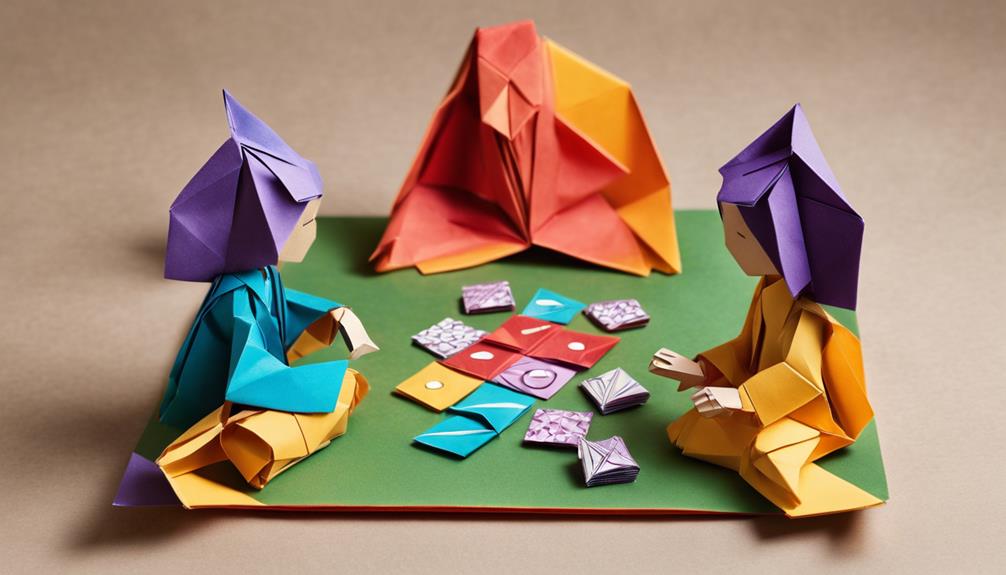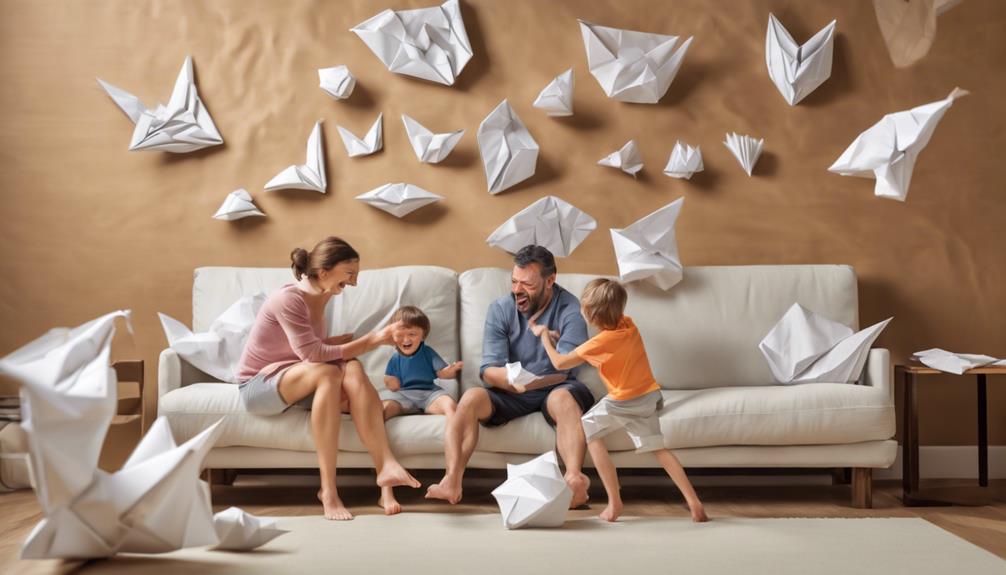Transform your family battles into moments of bonding by mastering communication skills and conflict resolution techniques. Active listening and empathy pave the way for understanding. Practice 'I' statements and compromise. Setting boundaries guarantees respect. Be a positive role model, offer praise, and spend quality time to strengthen relationships. Explore family counseling for structured growth. Engage in empathy-building exercises. Utilize worksheets and role-playing for effective communication. Family activities and games promote fun and connection. Family counseling emphasizes open dialogue, active listening, and mutual understanding. Dive deeper into building strong parent-child relationships through effective strategies and bonding activities.
Key Takeaways
- Practice active listening and empathy to understand each other's perspectives.
- Set clear boundaries to promote respect and harmony within the family.
- Use 'I' statements to express feelings and avoid blame during conflicts.
- Spend quality time together to strengthen bonds and build positive relationships.
- Seek family counseling for structured growth opportunities in resolving conflicts.
Effective Communication Strategies
To improve parent-child relationships, employ effective communication strategies such as active listening and open conversations.
Communication skills play an essential role in strengthening family bonds. When you actively listen to your child, you show them that their thoughts and feelings are valued. This promotes understanding and validation, creating a safe space for open conversations.
By engaging in honest dialogues, you encourage your child to express themselves freely, leading to the resolution of conflicts in a healthy manner. Empathy is key in connecting with your child on a deeper level, building trust and fostering stronger relationships.
Utilizing these techniques not only helps prevent misunderstandings but also enhances the overall quality of interactions within the family.
Conflict Resolution Techniques

Conflict resolution techniques empower families to address disagreements constructively through compromise and understanding, fostering healthier relationships and promoting harmony within the family unit.
Effective communication skills, such as active listening and using 'I' statements, play an important role in resolving conflicts peacefully. By practicing these techniques, you can create a safe space for open dialogue and mutual respect within your family dynamic.
Setting and respecting boundaries is another essential aspect of conflict resolution. Boundaries help maintain a healthy balance between individual autonomy and family cohesion, ensuring that everyone's needs and feelings are acknowledged and respected.
Additionally, conflict resolution strategies offered in family counseling can provide a structured framework for growth, healing, and nurturing individual development within the family unit.
Building Strong Relationships
Spending quality time together is essential for fostering understanding and strengthening the bond between parents and children. To build strong relationships with your children, consider the following key strategies:
- Be a Positive Role Model: Show your children healthy ways to deal with conflicts by handling disagreements calmly and respectfully. Children learn valuable skills for managing relationships by observing your behaviors.
- Offer Praise and Encouragement: Boost your children's confidence by acknowledging their efforts and achievements. Positive reinforcement not only fosters a sense of accomplishment but also contributes to a positive parent-child relationship.
- Engage in Open Communication: Create a safe space for expression by engaging in open and honest conversations with your children. Listening actively, validating their feelings, and communicating effectively can lead to healthier relationships within the family.
Family Conflict Resolution Worksheets

Family conflict resolution worksheets are fantastic tools to help you navigate disagreements and strengthen bonds within your family.
By focusing on effective communication, understanding emotions, and finding common ground, these worksheets can truly make a difference in how conflicts are resolved at home.
They offer practical exercises that not only address issues but also enhance problem-solving skills, bringing your family closer together.
Conflict Resolution Techniques
To effectively navigate family conflicts and strengthen relationships, incorporating family conflict resolution worksheets can be highly beneficial. Here are some conflict resolution techniques that can help you and your family work through disagreements and build stronger bonds:
- Active Listening:
Take the time to truly hear what the other person is saying without interrupting. Listening actively shows that you respect their perspective and can lead to better understanding.
- Open Communication:
Create a safe space where everyone feels comfortable expressing their thoughts and feelings. Encouraging open communication allows each family member to voice their concerns and work towards solutions together.
- Empathy and Understanding:
Put yourself in the other person's shoes to see things from their point of view. Showing empathy can help de-escalate conflicts and foster a sense of connection and support within the family.
Communication Strategies for Families
Utilizing family conflict resolution worksheets can enhance communication strategies for families, facilitating effective resolution of conflicts and strengthening relationships.
In family dynamics, communication serves as the cornerstone for fostering understanding and validation. Active listening plays a pivotal role in creating a safe space where open and honest conversations can thrive, allowing for the expression and resolution of conflicts.
By practicing empathy, both parents and children can deepen their connection, leading to healthier parent-child relationships. Conflict resolution techniques empower families to navigate disagreements with grace and efficiency, ensuring that conflicts don't escalate unnecessarily.
Additionally, setting clear boundaries within the family unit helps maintain harmony and promotes healthy interactions. Remember, effective communication is a two-way street that requires active participation and a willingness to listen and understand each other's perspectives.
Building Strong Relationships
Enhance your family relationships by incorporating family conflict resolution worksheets into your routine. Strengthening parent-child relationships is vital for a harmonious family dynamic. Here are three key strategies to help you build strong relationships and foster understanding within your family structure:
- Lead by Example:
Show your children how to resolve conflicts in a healthy manner by being a positive role model. Demonstrating effective conflict resolution skills will set a strong foundation for open communication and mutual respect.
- Offer Support and Encouragement:
Praise your children for their efforts and achievements. Providing encouragement boosts their self-esteem and reinforces the bond between parent and child. A supportive environment nurtures trust and fosters a positive connection within the family.
- Establish Clear Boundaries:
Setting boundaries within the family structure is essential for maintaining harmony and preventing conflicts. Clearly defined rules and expectations create a sense of security and order, promoting a respectful and cooperative atmosphere at home.
Communication Exercises and Tools

Let's chat about some cool tools and exercises that can really level up your communication game with your family.
Active Listening Techniques, Role-Playing Scenarios, and Empathy-Building Exercises are fantastic ways to get everyone talking and understanding each other better.
These tools can boost your relationships and help you navigate conflicts like a pro!
Active Listening Techniques
To improve your parent-child relationships and resolve conflicts effectively, mastering active listening techniques is essential in communication exercises and tools. Active listening involves fully concentrating on what the other person is saying, understanding their perspective, and responding in a way that shows you've heard them.
Here are three key aspects of active listening techniques:
- Paraphrasing: Restating what the other person has said in your own words shows that you're actively engaged in the conversation and trying to understand their point of view.
- Summarizing: Recapping the main points of the discussion helps make sure that both parties are on the same page and can clarify any misunderstandings.
- Reflecting Emotions: Acknowledging the feelings expressed by the other person demonstrates empathy and validation, fostering a sense of connection and trust.
Role-Playing Scenarios
When practicing role-playing scenarios in family therapy, you can enhance your communication skills by simulating real-life situations and actively engaging in various exercises. These counseling sessions provide a safe space for family members to express their thoughts, practice conflict resolution, and experiment with new communication styles.
Through role-playing, you can understand different perspectives, improve problem-solving abilities, and strengthen relationships within your family. By participating in these exercises, you have the opportunity to learn effective ways to listen actively, show empathy, and navigate conflicts constructively.
Role-playing allows you to practice strategies that promote understanding and bonding among family members. Embrace this chance to enhance your communication skills, foster better relationships, and build stronger connections with your loved ones. Engage wholeheartedly in these scenarios, and you'll discover the power of effective communication in transforming family dynamics for the better.
Empathy-Building Exercises
During empathy-building exercises focused on communication tools and activities, you'll enhance understanding and connection in your parent-child relationships. These exercises promote active listening and validation, creating a safe space for expression and empathy.
Here's how empathy-building exercises can benefit your relationship:
- Improved Understanding: By engaging in these activities, you'll learn to listen actively to your child's feelings and thoughts, fostering a deeper understanding of their perspective.
- Enhanced Connection: Through validation and empathy, you'll strengthen the emotional bond with your child, creating a supportive and nurturing environment for communication.
- Effective Communication: Utilizing tools like reflective listening will enable you to communicate more effectively with your child, resolving conflicts and promoting healthy dialogues.
Strategies for Family Counseling Sessions

In family counseling sessions, implementing effective communication skills is essential for fostering understanding and resolving conflicts within the family unit. Therapy sessions revolve around addressing conflicts and improving relationships through open dialogue.
Emphasizing communication skills like active listening and using 'I' statements can help de-escalate tensions and promote empathy among family members. By actively participating in conflict resolution techniques during counseling sessions, families can work together to navigate challenges and strengthen their bonds.
Family counseling serves as a supportive environment where families can address underlying issues, enhance communication, and build positive interactions. It provides a platform for every family member to express themselves and be heard, fostering a sense of unity and understanding.
Through these sessions, families can learn to communicate effectively, resolve conflicts constructively, and ultimately create a more harmonious and connected family dynamic.
Activities and Worksheets for Families

Utilizing interactive activities and worksheets can effectively enhance family communication and address conflicts in a constructive manner. When dealing with conflicts and resolving family relationships, consider the following:
- Engage in Structured Family Activities:
- Participate in structured activities like role-playing scenarios or completing worksheets together.
- These exercises can help family members express their feelings, understand each other's perspectives, and work towards common solutions.
- Utilize Conflict Resolution Worksheets:
- Worksheets such as 'Parenting With Purpose' and 'What Is Working' provide a framework for identifying areas of improvement and strengths within the family dynamic.
- By filling out these worksheets together, you can pinpoint areas of conflicts and collaboratively find ways to address them.
- Reflect and Discuss:
- After completing activities or worksheets, take time to reflect on the insights gained and discuss them as a family.
- Encourage open communication, active listening, and mutual respect to foster understanding and strengthen family relationships.
Games and Activities for Kids

Engage your children in various games and activities to promote bonding, fun, and skill development within the family dynamic. Board games like Monopoly not only provide entertainment but also teach valuable lessons in learning from mistakes and strategic thinking.
Physical games such as Tag offer a chance to have a blast, get moving, and strengthen family bonds through shared laughter and play.
Quieter activities like art and crafts encourage mindfulness, creativity, and self-expression in children, fostering a sense of calm and individuality within the family unit.
When families participate in activities tailored to kids, they create opportunities for conflict resolution, improved communication, and positive interactions. Just like how family therapy incorporates games and activities to enhance bonding and understanding, engaging in these tailored experiences at home can also nurture gratitude, appreciation, and harmonious relationships within your family.
Frequently Asked Questions
What Is the Best Way of Resolving Conflict Between Parents and Their Offspring?
The best way to resolve conflicts between parents and kids is through active listening and open communication. Establish clear boundaries and show mutual respect to promote healthy resolution.
Practice problem-solving together and take time-outs when emotions are high. By spending quality time together and modeling healthy conflict resolution, you can build strong parent-child relationships.
Teaching kids conflict resolution skills fosters positive family dynamics and equips them with valuable life skills.
What Is the Best Way to Help Children With Conflict Resolution?
Imagine conflict resolution as a dance where every step brings you closer to harmony. Encourage open communication, listen actively, and model healthy conflict behaviors.
Guide kids in problem-solving and using 'I' statements. Teach empathy and perspective-taking. Equip them with tools for constructive conflict resolution.
What Is the Parent Child Conflict Theory?
Parent-Child Conflict Theory explores the dynamics of disagreements between parents and children. It looks at how communication, expectations, and power play roles in these conflicts. Differing needs, values, and perspectives can lead to tension.
How to Improve Relationship Between Parent and Adult Child?
Improving your parent-adult child relationship is a journey worth taking. Start by listening actively, showing empathy, and setting boundaries respectfully.
Spend quality time together to build lasting memories and strengthen your bond. Acknowledge past conflicts and work towards resolution for a harmonious relationship.
Conclusion
In the journey of parent-child relationships, conflicts are bound to arise. Remember, it takes two to tango, so work together to find common ground.
Stay open-minded, listen actively, and communicate effectively to resolve issues.
As the saying goes, 'Rome wasn't built in a day,' relationships take time and effort to grow and flourish.
Keep practicing these strategies, and soon you'll see the fruits of your labor in a stronger, more connected family bond.
Keep up the good work!
Amina brings over a decade of journalism experience to her role as Editor-in-Chief. Under her leadership, Exquisite Post has flourished, maintaining the highest standards of integrity and excellence. Amina’s commitment to truth and her visionary approach guide the editorial team in producing impactful news stories that resonate with our audience.










